Whenever I’m in New York City and load up a MetroCard at the train station kiosk, I give the card readers extra scrutiny and think to myself, “such a high-volume spot would be a great place to inst…
Nice photos of skimmer
See on consumerist.com
Whenever I’m in New York City and load up a MetroCard at the train station kiosk, I give the card readers extra scrutiny and think to myself, “such a high-volume spot would be a great place to inst…
Nice photos of skimmer
See on consumerist.com
Frank Mayer and Associates, Inc. announced today that Michael Mayer has joined the company to further develop their growing portfolio of regional and national accounts. Michael Mayer is a fourth generation Mayer and a welcome addition to the production department.
Source: www.digitalscreenmedia.org
Family tradition continues at Frank Mayer. Mike Mayer, President, said “The recent addition as a fourth generation Mayer is a sign of our commitment to being the leading company in our industry. I’m confident that Michael will play a key role in providing and implementing high quality solutions for our clients.”
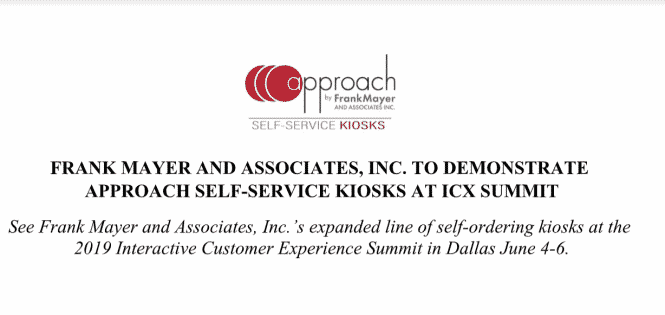
See Frank Mayer and Associates, Inc.’s expanded line of self-ordering kiosks at the 2019 Interactive Customer Experience Summit in Dallas June 4-6.
GRAFTON, WI – Find Frank Mayer and Associates, Inc.’s self-service kiosk line Approach at the 2019 Interactive Customer Experience (ICX) Summit at Omni Frisco Hotel in Dallas June 4-6. The freestanding, floor tablet, and counter self-order kiosks will be on display in booth #12, where attendees can test the units and interact with the kiosks’ QiTM software by ADUSA.
In addition to the original freestanding Approach floor unit, available as both a 32- and 22-inch touchscreen, Frank Mayer and Associates, Inc. recently expanded its roster of self-service kiosks to include a countertop unit, tablet, and wall unit.
The new line marries smart design with different sizes, offering an array of customization options and brand personalization – all while being backed by Frank Mayer and Associates, Inc.’s trusted name in delivering experience and unsurpassed quality in the interactive kiosk market.
Frank Mayer and Associates, Inc. is a leader in the development of in-store merchandising displays, interactive kiosks, and store fixtures for brands and retailers nationwide. The company helps retailers and brands utilize the latest display solutions and technologies to create engaging customer experiences. For more information on the Approach family of kiosks, visit www.olea.com/approach
***
CONTACT:
David Anzia, Senior Vice President of Sales
Frank Mayer and Associates, Inc.
1975 Wisconsin Ave., Grafton, WI 53024
[email protected]
FMA-ICX Summit Press Release
At HIMSS17, Epic Systems founder and CEO Judy Faulkner detailed two new electronic health record options for budget-conscious healthcare providers.
Source: ehrintelligence.com

Frank Mayer is the leader in creative design & manufacturing of branded in-store merchandising displays, interactive kiosks & POP marketing services.
Source: kioskindustry.org
2017 promises to be an active one for kiosks and similar self-service devices. A new whitepaper, “Opportunities for Self-Service Technology in 2017”, looks towards the direction self-service kiosks are headed. Developed and published by KioskMarketplace.com, this whitepaper is sponsored by Frank Mayer and Associates, Inc. and can be downloaded here.
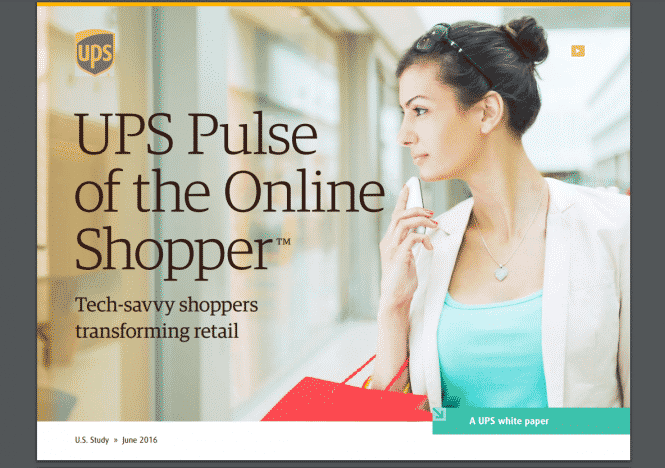
Nice research report from UPS covering shoppers and what it is seeing for data.
Excerpt:
While e-commerce offers new, unparalleled opportunities for accelerated growth, most retailers also are facing unprecedented challenges, and their very survival is in question. They must keep pace with ever-evolving technology and customer expectations. And omnichannel retailers are being pushed by shoppers to deliver a compelling, seamless experience across all channels. The lines of distinction between brick-and-mortar and digital experiences are forever blurred.
Excellence across all channels is considered table stakes, and organizations are struggling with how best to accomplish these objectives while remaining profitable. With change at a rampant pace, there is no longer a universal set of answers for how a retailer sets priorities and thrives. However, this much is clear: It is more essential than ever to understand the actions and motivations of today’s increasingly savvy, tech-driven shopper.
That is exactly what this study offers — insights on today’s well-connected, in-control shopper. Retailers of all sizes are experiencing tensions within their organization about prioritizing the changes needed to remain competitive. The insights offered here are designed to help them determine the best path forward as they navigate the intricacies of a market that’s never been more challenging.
2016_UPS_Pulse_of_the_Online_Shopper

|
Craig is a senior staff writer for Kiosk Industry Group Association. He has 25 years of experience in the industry. He contributed to this article. |
Monte Carlo kiosk by Olea Kiosks at recent Scientific Games tradeshow in Las Vegas
Versatile Kiosk for Ultimate Performance
A modern approach to the player experience
Our latest winning kiosk for casinos features card-printing and vibrant LED lighting that can be controlled remotely or programmed, and its sleek design fits in any décor.
The Monte Carlo boasts robust components that stand up to 24/7 use. Two large LCD panels create a rewarding touch experience for users, while the highly visible digital signage is perfect for advertising, wayfinding and more.
News from our member Evolis which provides kiosk card printers.
Brochures:
Evolis, much more than card printers
Newsletter
As usual Mr. Krebs has some great images of a credit card skimmer found in the wild. This model uses Samsung phone parts and lays right over the Ingenico card..
Source: techcrunch.com
Self-checkout coming to all San Diego libraries
Source: www.sandiegouniontribune.com
New checkout machines coming to San Diego libraries,
DETROIT, April 26, 2017 /PRNewswire/ — DivDat Kiosk Network President Jason Bierkle presents No-Fee payment kiosk model to Detroit City Council
Source: www.prnewswire.com
The Utah Supreme Court has issued another loss to three drivers in a lengthy fight over parking tickets.
Source: www.sltrib.com

No amount of mental willpower or foot-tapping can get you through an airport security line faster, but there is a new biometric service called CLEAR that can.
Source: www.businessinsider.com

Gateway Ticketing Systems will be exhibiting at IAAPA Attractions Expo for the 25th consecutive year, Nov. 13-17, 2017, in Orlando.
Source: www.gatewayticketing.com
Located at Booth #4854, the Gateway Ticketing Systems team will give booth visitors a sneak peek at its ‘next generation’ kiosk interface currently in development as well as showcase some of its recently released solutions including:
Reporting Plus | Powered by Galaxy – Any Data, Anytime, Anywhere
This new reporting solution captures all transactional data from an attraction’s Galaxy® point-of-sale, membership and admission control software. From there, customers can access a suite of standard reports on both traditional and mobile devices, extract reports and data in a wide range of formats, automate report delivery and easily develop custom reports.
CRM Plus | Powered by Galaxy – 360-Degree Customer View with One Solution
This powerful customer relationship management tool integrates seamlessly with our Galaxy® point-of-sale software. CRM Plus enables attractions to conduct segmentation analysis and trigger real-time personalized communications to deepen relationships with its guests.
Galaxy Connect – 2016 IAAPA Brass Ring Best New Product Award – 2nd Place for Technology Applied to Amusements: Facilities
This cloud-based platform enables attractions and online travel agencies to easily and securely sell live tickets, even for capacity-managed events. Galaxy Connect eliminates the need for vouchers, saving hours of tedious back-office work. Booth visitors will learn how the Galaxy Connect community has grown, adding some of the world’s largest online travel agencies to the platform.
What took place this week in the credit card and payment industries
Source: www.forbes.com
Last year marked a large shift in the world of data breaches. For the first time, Social Security Numbers were compromised more than credit cards. A staggering 16.7 million consumers were affected by identity fraud last year, an 8% increase over year-ago levels and the highest volume since Javelin Strategy & Research began their annual surveys in 2003. This fraud resulted in losses of $16.8 billion.
New self-serve technology at one East Valley medical clinic is allowing patients to quickly receive prescriptions and over-the-counter medications from a kiosk immediately following an appointment.
Source: www.eastvalleytribune.com
The 15th China International Self-service, Kiosk and Vending Show
(CVS) – the second largest in the world – is the place to get all of
the resources you require to achieve your business goals and to
fulfil the needs of the entire convenience services industry.
Now with its collaboration with C-Star – Shanghai’s International
Trade Fair for Solutions and Trends All about Retail – the future of
retail is about to be reshaped. The World of Retail.
The two trade fairs will be held from April 26 to 28, 2018 at
Shanghai New International Expo Centre, concurrently with Hotel
Plus, with an expected turnout of over 200,000 trade visitors,
including industry professionals and consumers.
As the official satellite show of EuroShop, the world’s No.1 Retail
Trade Fair, C-star presents the latest developments in global retail
industry.
And after 15 of continuous growth, CVS is now recognised as the
industry’s most valuable self-service and retail trade fair.
This partnership will allow CVS and C-star to explore massive new
business opportunities, able to connect upstream and downstream
retail industries by integrating their resources, strengths, exhibitors
and audience relationship.
‘World of Retail’ will explore emerging industry trends, build the
best exchange platform through both online and offline channels for
manufacturers and retailers from home and abroad, and provide
quality and comprehensive solutions for retailers and buyers
worldwide.
The organizers expect to hold more than 200 exhibitors, featuring
many well-known global corporate brands, and emerging industry
players. Further, CVS comprehensively focuses on the smart retail
field by concurrently holding Shanghai Smart Retailing Show 2018
and Smart Retailing Summit Forum 2018, further expanding in
exhibition scale, integration of self-service and smart retail
resources and to create a cross-sector event.
In addition, C-star 2018 International Retail Forum will be held
concurrently as a knowledge platform for the retail industry.
Themed ‘Retail, People-Oriented’, this forum connects domestic and
foreign retail experts, industry leaders, real estate developers,
shopping mall executives, retail brands and additional high-profile
speakers, to create the best platform for gaining new knowledge in
a wide spectrum of business areas.
This partnership brings together both organizer’s resources, and
combines both parties’ strengths and industry clout to bring real
changes and innovations to the global retail business.
Early online registration for both major events is encouraged for all
visitors. Please visit their official website: CVS pre-registration
For further enquiries please contact:
Shuree Shen
[email protected]
+86 21 3339 2017

For more details or to register, visit www.accessibilityonline.org/
The Section 508 Best Practices Webinar Series provides helpful information and best practices for federal agencies in meeting their obligations under Section 508 of the Rehabilitation Act which ensures access to information and communication technology in the federal sector. This webinar series is made available by the Accessibility Community of Practice of the CIO Council in partnership with the Access Board.
Section 508 Best Practices: Putting the Revised 508 Standards into Practice for Procurement Add to Calendar
May 29, 2018, 1:00 – 2:30 (ET)
Presenters:
• John Sullivan, Government-wide Section 508 Program Director, GSA
• Kevin Funk, Program Analyst, GSA
• Kathy Eng, Senior ICT Accessibility Specialist, U.S. Access Board (moderator)
Registration: www.accessibilityonline.org/cioc-508/session/?id=110667
New mounts offer quick, safe, and easy installation, supporting a wide range of large venue projector mount brands
AURORA, Ill. – July 17, 2018 – Peerless-AV®, an award-winning designer and manufacturer of the highest quality audio and video solutions and accessories, today announced the availability of its Large Venue Projector Mount (PJR250).
An extension to Peerless-AV’s projector mount product line, the PJR250 is designed to provide a quick, safe, and simple installation – making it the ideal solution in rental and staging settings where products in venues may frequently change.
The PJR250 features a low profile, pre-assembled design with a Hook-and-Hang™ system and unique dedicated adaptor plates that support all major large venue projector brands.
“In developing our Large Venue Projector Mount, our team focused heavily on the impact that the design would have on the installation process,” said Nick Belcore, Executive Vice President of Global Sales and Marketing, Peerless-AV. “Including options like the Hook-and-Hang™ feature as well as dedicated adaptor plates was a must for this solution. We wanted integrators to be able to install and un-install large format projectors as seamlessly as possible.”
For a quick and easy installation, the PJR250 includes a simple Hook-and-Hang™ feature, which provides a large landing area when securing a projector to the mount. In addition, the dedicated adaptor plates place the center of gravity in the middle of the mount, simplifying adjustments and achieving the perfect balance when ceiling or flush mounting a projector. A unique feature in the market, these adaptor plates significantly reduce installation time by eliminating the need to install legs, which can be difficult to stabilize and can lead to projector sag over time.
To obtain perfect image alignment, the PJR250 features horizontal adjustment up to 3″ as well as tilt (+15/-5°), roll (±5°), and swivel (360°) adjustment, which are lockable to prevent even the smallest shift to the image once installation is complete.
The PJR250 includes a safety cable for assurance when handling and installing large projectors, as well as integrated cable management, allowing the cables to be routed through the projector mount for a clean aesthetic.
Peerless-AV’s Large Venue Projector Mounts are available now through Peerless-AV direct sales representatives and authorized distribution networks.
For more information, please visit www.peerless-av.com/en-us/professional/products/PJR250.
Connect with Peerless-AV via social media on Twitter, Instagram, LinkedIn, Facebook, and YouTube.
Driving Technology Through Innovation
For over 75 years, passion and innovation continue to drive Peerless-AV forward. We proudly design and manufacture the highest quality products, ranging from outdoor displays to complete kiosk solutions, digital signage mounts to wireless systems. Whether a full-scale global deployment or custom project, Peerless-AV develops meaningful relationships and delivers world-class service. In partnership with Peerless-AV, you are trusting an award-winning team of experts who will support your business every step of the way. For more information, visit peerless-av.com.
Media Contact
Beth Gard
(732) 212-0823
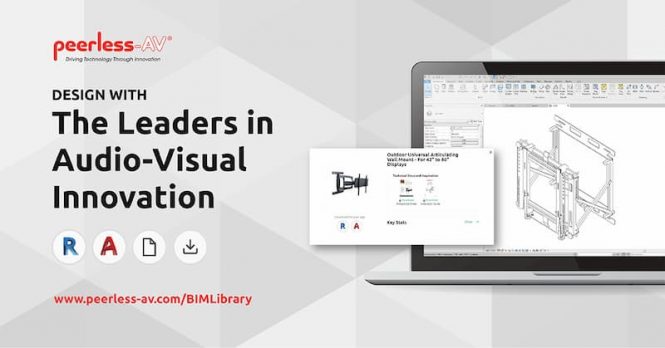
New software offers ease in implementing Peerless-AV solutions into digital designs

With BIM data now easily accessible, architects and other building professionals can integrate highly realistic models of Peerless-AV products directly into their digital designs, rather than drafting them independently or using generic placeholders. Each digital model includes all the necessary data, specifications, and certifications that professionals need from manufacturers when designing a building. The files are also modeled for compatibility with industry standard design tools like Autodesk Revit, further establishing Peerless-AV as a simple yet valuable information source in the designer’s everyday workflow.
“Innovation at Peerless-AV stretches back over 75 years since our founding,” said Nick Belcore, Executive Vice President, Peerless-AV. “We are thrilled to continue that legacy by providing the architecture and design community with intuitive digital design tools. Teaming with engineers and architects to create our Revit files, we are able to provide more relevant architecture data and fully interactive models. These offerings truly set Peerless-AV apart as the leader in audio visual innovation.”
By partnering with BIMsmith, the entire Peerless-AV BIM library is also accessible to thousands of building professionals on the BIMsmith Market platform, a cloud tool for building product research and selection.
“The name Peerless-AV carries with it a long history of quality and reliability that is highly important to building professionals,” said Benjamin Glunz, CEO, BIMsmith. “We are excited to bring their products to the BIMsmith platform.”
The Peerless-AV digital models include a wide selection of display wall mounts, video wall mounts, kiosks, outdoor TVs and more. The entire Peerless-AV BIM library can be found at www.peerless-av.com/BIMlibrary.
Connect with Peerless-AV via social media on Twitter, Instagram, LinkedIn, Facebook, and YouTube.
About Peerless-AV
Driving Technology Through Innovation
For over 75 years, passion and innovation continue to drive Peerless-AV forward. We proudly design and manufacture the highest quality products, ranging from outdoor displays to complete kiosk solutions, digital signage mounts to wireless systems. Whether a full-scale global deployment or custom project, Peerless-AV develops meaningful relationships and delivers world-class service. In partnership with Peerless-AV, you are trusting an award-winning team of experts who will support your business every step of the way. For more information, visit peerless-av.com.
About BIMsmith
BIMsmith, the leading cloud-based building product discovery and selection platform, cultivates global business-to-business relationships between building industry professionals and building product manufacturers. Through direct integration of real product data into the BIM workflow, BIMsmith continues to shape the future of building science technology, placing its clients at the forefront of BIM innovation while addressing the true needs of industry professionals. Learn more about BIMsmith at https://www.bimsmith.com.
Media Contacts
Beth Gard Ethan Adams
Peerless-AV BIMsmith
[email protected] [email protected]
(732) 212-0823
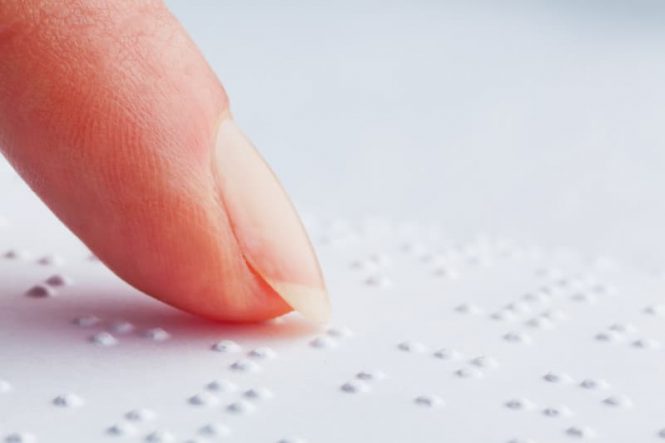
Article on Hospitality Tech by Vispero Feb 2020
By Laura Boniello Miller, Corporate Business Development Manager for the JAWS Kiosk program at Vispero, parent company of The Paciello Group – 02/26/2020
People with disabilities travel and dine out just like everyone else. Research conducted by the Open Doors Organization in 2015 found that “more than 26 million adults with disabilities traveled for pleasure and/or business, taking 73 million trips.” This spending has a significant impact on the travel industry, but sometimes the technology employed by hotels and restaurants is not accommodating to people with disabilities. This offers hospitality an excellent opportunity to employ self-service technology that will improve their disabled guest’s experience and capture more of their spending power with accommodations and services that support this group.
Jaws Kiosk – Vispero Storm Collaborate on Accessible Kiosk Solution
ADA JAWS Accessibility Software – Gold Sponsor – Vispero – Kiosk Consultant
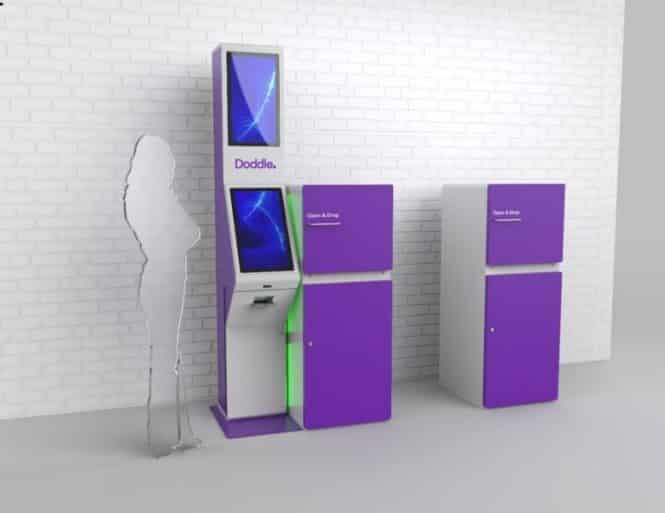
From Kiosk.com Jun2020
We all know that returns are an essential part of the consumer journey, yet they can cause retailers some serious trouble to process. For instance, in-store returns are a great way to recapture lost revenue from returns, but processing them at the checkout can cause longer lines, create more work for staff and extend wait times for customers who are trying to buy something.
While 61% of Americans prefer to return goods in-store according to UPS research, those retailers who do offer in-store returns generally have not adapted specifically for this customer journey. Customers with a return transaction often have to wait in line with everyone else to sort their return out and after their handover, may wait up to 3 weeks for credit card refunds (where these are offered).
Alternatively, customers can book ahead using the digital portal, linked via the retailer website, and hosted by Doddle. In this return path, customers simply scan the code from the portal once they’re in store, and the label is automatically printed. Once they’ve applied the label and dropped the parcel into the hatch, they’re free to shop. When making an in-store return, 70% purchase an additional item compared to only 42% who make a new purchase while processing an online return.
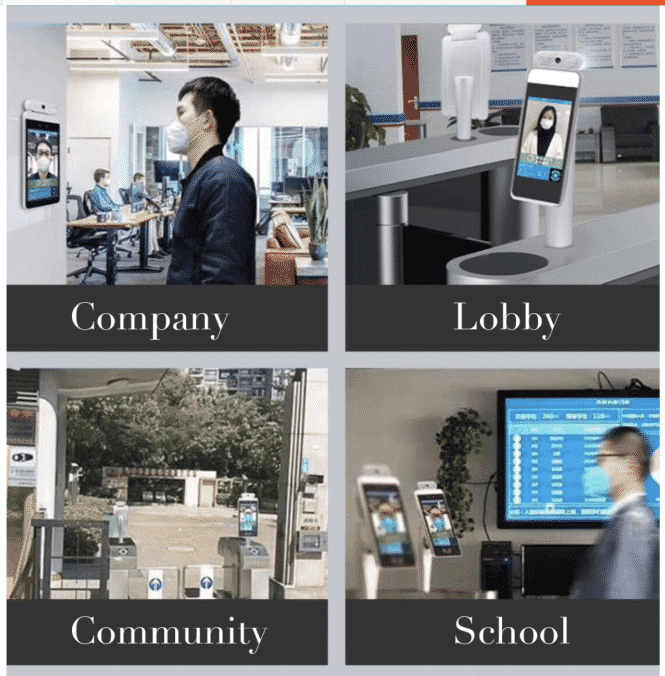
Most agree that the coronavirus pandemic will accelerate
mobile commerce and contactless approaches. In response to the global COVID-19 virus prevention and control, TDS has developed a revolutionary technology, contactless temperature measurement intelligent identification terminal.

Temperature-sensing kiosks can help
prevent crises and optimize return to business as employees and guests return to work and entertainment venues.
Features
Please consult us for more information.
Website:www.ustdstouch.com
Email:[email protected]
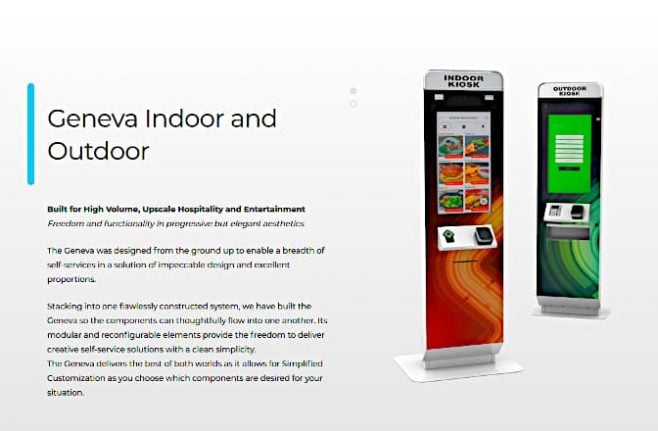
From LinkedIn Aug2020 – Frank Olea, CEO of Olea Kiosks announced on LinkedIn yesterday his new outdoor ticketing kiosk, Geneva. Has some very nice engineered design features. Olea is at the top of outdoor kiosk design so it isn’t surprising at all to see this very nice unit.
“I’m proud to announce our newest Kiosk model, the Geneva. This kiosk design is ultra-versatile and is available in Outdoor as well as Indoor versions. It’s our ‘Swiss Army Knife’ hence, Geneva.”
This new indoor / outdoor kiosk provides for printing tickets, wristbands, cards or even plain old receipts. The 27” high brite LCD display is sure to get the message out that you are open for business. This is also our first model to feature contactless touchscreen options as well.

You can click the image and see a full screen image detailing the nice engineering touches Olea did.
[contact-form to=”[email protected],[email protected]” subject=”Olea Geneva”][contact-field label=”Name” type=”name” required=”1″][contact-field label=”Email” type=”email” required=”1″][contact-field label=”Message” type=”textarea”][contact-field label=”Phone” type=”text”][/contact-form]
Editors Note – All of the most mature Browser Lockdown products for secure desktop use the Chrome Engine. This latest device integration by Google is significant. NFC (Near Field Communications) is a core technology used often in self-service kiosks. Browsers have become the viewports for all.
Web browsers are developing and evolving faster than ever, and this is certainly true of Google Chrome. The company has just released a new beta version the browser – Chrome Beta 89 – and it includes a number of keys updates to APIs that open up a host of exciting new features.
There are different things to look forward to depending whether you’re using the mobile or desktop version of Chrome, but Android users on the beta program have gained a new way to interact with NFC tags. Desktop users have an easier way to share content to social media, and there’s more too.
Google has enabled web NFC (Near Field Communications) by default, which means Android users can interact with displays and exhibitions at museums and galleries, sign into buildings, and more. Android devices running Chrome 89 can also write to NFC tags which has lots of possibilities.

Published: February 09, 2021
Analyst’s Takes
As stated in our B2G Market Advisor blog, we expects the 2021 bid volume for the SLED market to rebound to 96% of its 2019 peak level. This is due to the fact that the fiscal impacts of COVID-19 response and related economic impacts were not as severe as expected in 2020. In fact, a Brookings analysis recently found that job cuts (layoffs and furloughs) in the SLED sector actually outpaced revenue declines and that federal aid to SLED entities to this point has exceeded revenue shortfalls by $50 billion. So, this leaves us to examine to what degree the SLED sector “needs” the aid, in what areas, and what the most likely uses of such aid would be.
$350 billion in generalized (or unrestricted) aid
Since the middle of 2020, the idea of generalized aid for states and localities has been hotly debated. The most common justification for the funding is to spur SLED rehiring of workers who have been laid off or furloughed. During the economic shutdown that was imposed to contain COVID-19, the SLED sector shed more workers than in the Great Recession of 2008-10. According to U.S. Bureau of Labor Statistics (BLS) data as of November 2020, the “State government education” category (mostly higher education) had reduced its workforce by 340,300 workers. “Local government education” (mostly K-12) had reduced its workforce by 666,200. “Local government” (other than education) was down 320,400 and “State government” (other than education) was down 15,200. Given that many of these workers are in support roles (e.g., custodial, maintenance, landscaping, housing, dining, security, transit) that will not be needed until on-premises activities resume, a large portion of this aid could be used for backstopping the compensation of those idled workers still receiving pay and/or benefits, freeing up funds for use in other areas.
Also, a unique trend for the SLED sector during this recession has been the use of general bond funding for (according to a Pew report):
…direct deficit refinancing, where the money from bonds or loans is used to replace money that would ordinarily have been collected from taxes to fund regular, ongoing government programs. There was also evidence of what we’d call indirect deficit refinancing, such as using money from bonds to pay for projects that previously were paid for with cash.
While it is impossible to determine exactly how much borrowing occurred, an analysis by the source cited above points toward at least one quarter of all issuances examined involved deficit financing. Therefore, it is likely that SLED governments will use some of the unrestricted aid to pay off some of these debts, which would free up payment obligations for use in other areas.
$170 billion for K-12 and higher education
Education has received the largest portion of dedicated SLED funding during the previous rounds of aid. Early indications are that the next round of aid will be focused on returning schools to on-premises learning. It is also likely that a significant portion could be used for backstopping the compensation of idled workers, freeing up funds for use in other areas. However, one key consideration that has drawn significant attention and was mentioned by President Biden in a recent interview is the upgrading of ventilation in educational facilities. Also, of concern would be ventilation and other precautions on K-12 and campus buses.
$20 billion national vaccination program
Among the ideas floated for this funding are community vaccination centers, mobile centers, and reimbursement of costs for using the National Guard for vaccinations. Previous rounds of federal vaccination aid have taken some of the cost burden off the shoulders of SLED governments; however, if vaccines are to reach saturation levels of distribution, the Biden administration will need to flood all channels with the necessary resources. This funding will significantly boost SLED capacity in this area.
$28 billion for transit and airports
With ridership drastically reduced, $20 billion in aid is anticipated for transit systems and $8 billion for airports to keep systems running and facilities in order until ridership recovers.
It is likely that education, vaccination, and transportation related funds will be distributed using previously established formulas from the CARES Act. The flexible aid is new, and it is likely that allocation will be along the lines of what was proposed in the House Democrats’ HEROES Act late last year. In that case, the District of Columbia was to be treated like a state and all state funds were to be allocated based on “a state’s share of unemployed workers.” City and county funding was to be “evenly divided between municipalities and counties.” Municipal funding was divided between cities with populations of at least 50,000 (roughly two-thirds of funding) and cities with populations under that figure (roughly one-third of funding). County funding was to be allocated based on population.
Updated February 8, 2021
The National Asphalt Pavement Association has published a table comparing the transportation infrastructure initiatives of the prior Trump administration to the current Biden administration which can be viewed here. The two significant differences are the cost and focus on climate.
Biden’s Build Back Better plan has an investment of $2 trillion over 4 years compared to the prior administration’s of $1 trillion over 10 years. Biden’s plan also includes initiatives toward encouraging clean energy, the manufacturing and purchasing of zero-emission vehicles, and expanding infrastructure including installation of more electric vehicle chargers. The prior administration’s plan did not specifically address infrastructure in relation to the climate.
Updated February 3, 2021
Pete Buttigieg was sworn in as Transportation Secretary on February 3, 2021 and has provided some further, but brief, insight into the initiatives we are likely to see under his leadership. The Secretary understands the economic impacts the pandemic has had on the transit industry, and will strive for initiatives toward regaining the public’s trust in an effort to increase ridership in mass transit. Buttigieg is also expected to play an important role in President Biden’s climate and infrastructure initiatives. There will be an emphasis on zero emission mass transit vehicles and the expansion of electric vehicle infrastructures.
Per an email sent to Department of Transportation staff, obtained by the Associated Press, Buttigieg said he will spend the next few weeks speaking with employees, likely in an effort to establish the Department’s initiatives under the new administration. It may be several more weeks before we begin to see specifics on these initiatives.
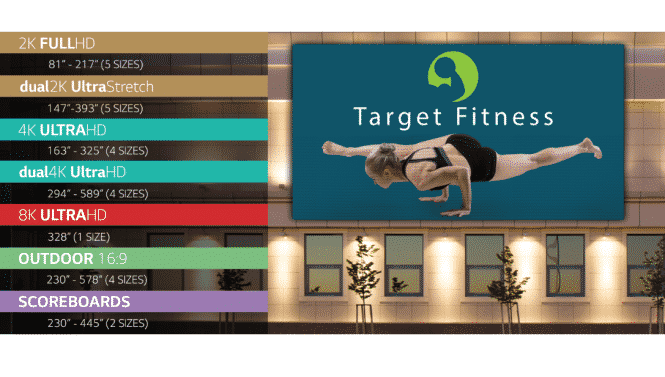
Direct View LED display bundles announced by LG Business Solutions – March 2021
At LG we know that selecting the right Direct View LED display can sometimes be difficult, so we created the DVLED Ultimate Business Display to make it easier. LG has created one display solution pre-configured with all the components needed for full operation* that includes options for both indoor and outdoor operation with fixed resolutions ranging from Full HD up to 8K Ultra HD. The Ultimate Business Display comes in 25 size configurations from 81 inches to as large as 589 inches (49 feet) and aspect ratios in both 16:9 and 32:9 ultra stretch formats.
Nice review of the new offering by Dave Haynes at sixteen-nine.net
Excerpts:
The bundles are pitched as all parts and components in one ready-to-assemble bundle. They include the LED components, controller, CMS software (assume LG’s SuperSign), a rugged shipping case on wheels, training and three years of after-care support.
The crazy ones are the 8K and the dual 4K 589-inch one, which is 49-feet diagonal, or JUST a little too big for my TV room.
Makes it easy for integrators and sellers to just buy on needed dimensions and use.
Samsung also bundles some LEDs, Sony has started to with its 2nd Gen Crystal LEDS, and a bunch of pure-play LED manufacturers – from SNA to smaller, lesser-known ones – also have bundles.
More Information LG Business Solutions
For more information Send us a note…
[contact-form][contact-field label=”Name” type=”name” required=”true” /][contact-field label=”Email” type=”email” required=”true” /][contact-field label=”Website” type=”url” /][contact-field label=”Message” type=”textarea” /][/contact-form]
From APNews June 2021 and PRNewswire
DENVER, Colo., June 18, 2021 — The Unattended Self-Service and Kiosk Association is participating in two major upcoming events for Retail and Restaurants in the next week – NRF Retail Converge and CREATE by Nations Restaurant News. Learn from speakers such as CVS, Walgreens, Macys, Alibaba and others at Retail Converge. CREATE speakers include Yum! Brands, Chipotle, McDonald’s, Wendy’s, Dominos and many more. Retail Converge begins next week and CREATE has just launched.
Noted sponsors for the Kiosk Association include:
In other news for the Association a resource page for Assistive Technology is now available listing provider companies, noted consequences for not providing and additional resources. A companion page covering the latest Legal News is now available. This page is a running log with personal commentary on legal, privacy and patent situations. We keep track of legal news that affects the unattended self-service market.
Examples this week include the lawsuit against McDonalds for improper use of biometric data and a class action suit against over 125 Wendy’s franchisees for ADA violation. Learn about PPI which is how we abbreviate Prosecution Probability Index. Our new DOJ is expressing interest in cases never before expressed.
Sample News Posts
For more information contact Craig Keefner, 720-324-1837 or [email protected] or you can visit Kiosk industry, KMA.global, Retail Automation, Digital Business, Menu Board Solutions, Digital Signage Solutions and Thinclient
*LOGO link for media: https://www.Send2Press.com/300dpi/20-0315s2p-kioskma-300dpi.jpg
Editors Note: thanks to Chris and Send2Press – recommended
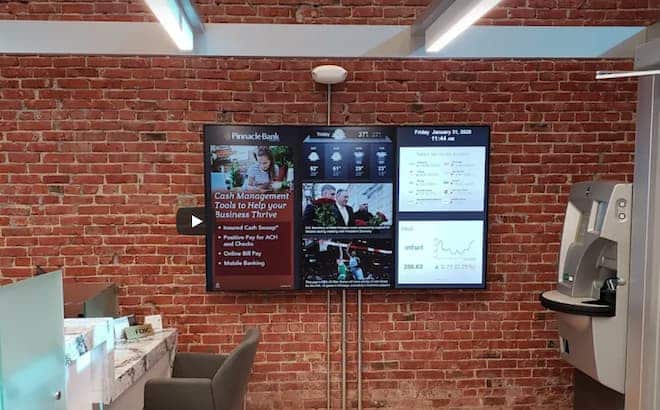
April 2022 — Nanonation, a leading public space interactive, and digital signage solutions provider, is pleased to announce that Tyler Cobb has joined Nanonation’s sales team as a senior account executive. With 20 plus years of experience in the static and digital signage industry, Cobb has demonstrated proficiency in all aspects of the industry, including production, installation, servicing, marketing, and sales, with past industry-related roles.
“We are excited that Tyler has joined our team at Nanonation. Along with Tyler’s extraordinary track record, his ability to breakdown the complex into manageable, tactical, and actionable steps that deliver results mesh perfectly with our customer first focus.” said Brian Beach, Nanonation’s Senior Vice President of Sales.
Cobb’s previous roles include Purchasing Director, Director of Estimating, and Director of Sales and Market Development for some of the industry’s leading names in the static and digital signage landscape, securing his expertise in signage marketing strategy, product positioning, and sales support. He also brings his extensive industry knowledge to the Nanonation team and the many relationships he has built working within the financial, QSR, hotel, restaurant, casino, government, and retail industries throughout the past decades. Cobb is an alumnus of The University of North Carolina at Chapel Hill, earning both a Bachelor of Science degree in Psychology and a Bachelor of Arts in Political Science.
“I am thrilled to be a part of and join the Nanonation team. My entire career has been spent learning this industry and implementing how to better serve clients’ needs with information, technology, solutions, and service after the sale. I look forward to continuing that tradition by providing ‘industry-leading solutions to Nanonation’s current and future clients,” said Cobb.
More Posts

Race fans will be able to place bets at the track during this weekend’s NASCAR tripleheader at Dover Downs Racetrack.
Source: www.delawarepublic.org
Dover Downs Casino staff will be taking bets from the kiosk on Saturday’s NASCAR Xfinity Series and Sunday’s Monster Energy series playoff races as well as the full menu of sports.
Dover Downs Racetrack Assistant Vice President of Marketing Gary Camp says Las Vegas odds-makers William Hill will set the odds for individual drivers.
This is the first time in NASCAR history fans can legally bet on a race on location.

Ok, I’ll take a shot at this. My name is Craig Keefner and I work for Olea Kiosks which is a highly skillled kiosk manufacturer and designer in ADA. Note that this is my personal opinion. The engineering design team never agrees with me 100%, usually for the better 🙂
“It depends…”.
What an answer eh…
The reason for that is that while there is no grandfather clause there is a “Safe Harbor” but it comes with conditions.
From the ADA National Network
The ADA does not have a provision to “grandfather” a facility but it does have a provision called “safe harbor” in the revised ADA regulations for businesses and state and local governments. A “safe harbor” means that you do not have to make modifications to elements in an existing building that comply with the 1991 Standards, even if the new 2010 Standards have different requirements for them. This provision is applied on an element-by-element basis. However, if you choose to alter elements that were in compliance with the 1991 Standards, the safe harbor no longer applies so the altered elements must comply with the 2010 ADA Standards.
A “safe harbor” does not apply to elements that were NOT addressed in the original 1991 Standards but ARE addressed in the 2010 ADA Standards. These elements include recreation facilities such as swimming pools, play areas, exercise machines, miniature golf facilities, and bowling alleys. On or after March 15, 2012, public accommodations must remove architectural barriers to these elements listed above are subject to the new requirements in the 2010 Standards when it is readily achievable to do so.
Here is another take on it from Chain Store Age
Losing “Grandfather” Status: Between 2007 and 2014, the amount of ADA charges doubled from $54.5 million to $109.17 million, with 3,190 suits filed in 2007 compared to 5,347 suits in 2014. But some retailers may assume – incorrectly – they are already covered due to “grandfathering” rules.
Any development or remodeling completed using the previous 1991 ADA standards before the new changes became effective March 15, 2012 will be grandfathered as compliant with the ADA. However, if any element that meets the 1991 requirements is altered, it must then meet the newer standards, and the “safe harbor” no longer applies.
Complicating things here can be local and state laws (Unruh in California for example).
That’s why I will say, “it depends..”.
TO BE SURE — having said all that doesn’t mean people are not going to necessarily sue. Some lawyers are more concerned with how much they can negotiate from you than whether it is right or wrong.
And if the units do not meet 2010 requirements, is it also “the better thing to do” to bring the units up to code, or at least mitigate in some way. That could forestall a frivolous suit which will cost thousands no matter what.
For more “opinion” like this on all types of subjects be sure and visit The Lab website which is run by Olea. I’ll be doing a writeup on the kiosk market size and get into what exactly is a kiosk when we talk market size and units. Are ATMs a kiosk? Or POS checkouts? Or are they there own singular purposed market which just so happens to incorporate some characteristics of a typical kiosk. If anything, I can gurantee you that am opinionated..
COMMENTS
More ADA News
Walmart’s 200 “Walmart Academy” training centers are all planning to incorporate virtual reality by the end of 2017, after an earlier pilot program. The limited curriculum is being produce
Source: www.theverge.com
Alphabet chairman and former Google CEO Eric Schmidt said he looked for employees who could “thrive in chaos.”
Source: www.businessinsider.com
Max James of American Kiosk Management has crashed plenty of times. He swears he and his mall kiosks can rebound yet again.
Source: fortune.com